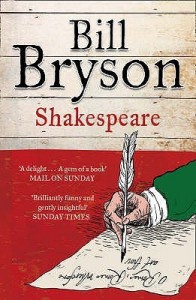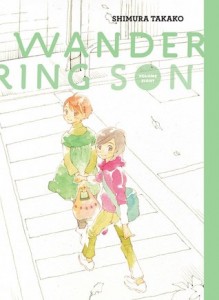 I picked up Vol 1 of Wandering Son by Takako Shimura because it was displayed quite prominently at the main branch of the local library, and pretty much devoured the first 7 volumes in quick succession last year. I never got around to writing about it, and so thought I’d borrow one of them again as a reference to get a blog post down, but then found that Vol 8 had made its appearance, so I borrowed that instead.
I picked up Vol 1 of Wandering Son by Takako Shimura because it was displayed quite prominently at the main branch of the local library, and pretty much devoured the first 7 volumes in quick succession last year. I never got around to writing about it, and so thought I’d borrow one of them again as a reference to get a blog post down, but then found that Vol 8 had made its appearance, so I borrowed that instead.
The plot of Wandering Son centers around Shuichi Nitori, «a boy who wants to be a girl», and Shuichi’s friend Yoshino Takatsuki, «a girl who wants to be a boy» and I find it quite fascinating for a variety of reasons. There are another 7 volumes to go, and I will definitely be reading them all once they appear in English.
According to the wikipedia page, the series has received a lot of positive attention, but has also been criticized for the unrealistic maturity of the protagonists. To some extent I suppose there’s something in that. The series starts when Shuichi starts fifth grade at a new school, and on the whole most of the people he meets seem curious and accepting of gender bending, which has struck me as somewhat unrealistic. The only really antagonistic and, in contrast with all the rest, childish reactions come from Shuichi’s sister. And perhaps both Shuichi and Yoshino are more maturely self-aware than one could expect. On the other hand I suspect being transgender, in whatever degree or form, would tend to force self-awareness on any kid.
On the plus-side the artwork is delightful, deceptively simplistic. The characters may be unrealistically mature, but they are loveably human and I find it fascinating to follow their transition into puberty (which holds unusual challenges if you’re transgender) and their attempts at coming to terms with their identity.
The English edition is «unflipped», which means that though the text is translated, the pages are printed like the original, you need to start at what we’d consider to be the back of the book and read the panels from right to left. You’d think this would be tricky to keep track of, but once you’re into the story it’s such a page-turner that I really didn’t notice.
On the whole I highly reccommend Wandering Son. If you’ve been meaning to read more graphic novels, or try manga, this is a pretty good place to start. And for me it covers all of two topics on the Book Riot Read Harder challenge, so that’s a boon, too.
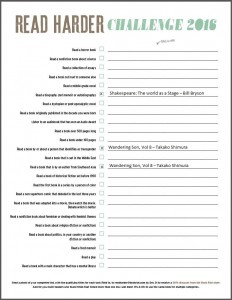
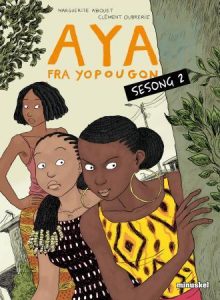 Jeg leste den første samlingen om Aya i 2016, men skrev ikke om den. Det blir ikke noe langt innlegg om del to heller, men jeg synes serien fortjener noen ord. Forfatteren av serien, Marguerite Abouet, er selv fra Elfenbenskysten der handlingen i denne tegneserien – eller «grafiske romanen» – er lagt. Abouet flyttet til Frankrike når hun var tolv, fortellingen og Aya er basert på hennes barndomsminner om livet i Abidjan, i det som var en fredfull og framgangsrik periode i Elfenbenskystens historie.
Jeg leste den første samlingen om Aya i 2016, men skrev ikke om den. Det blir ikke noe langt innlegg om del to heller, men jeg synes serien fortjener noen ord. Forfatteren av serien, Marguerite Abouet, er selv fra Elfenbenskysten der handlingen i denne tegneserien – eller «grafiske romanen» – er lagt. Abouet flyttet til Frankrike når hun var tolv, fortellingen og Aya er basert på hennes barndomsminner om livet i Abidjan, i det som var en fredfull og framgangsrik periode i Elfenbenskystens historie.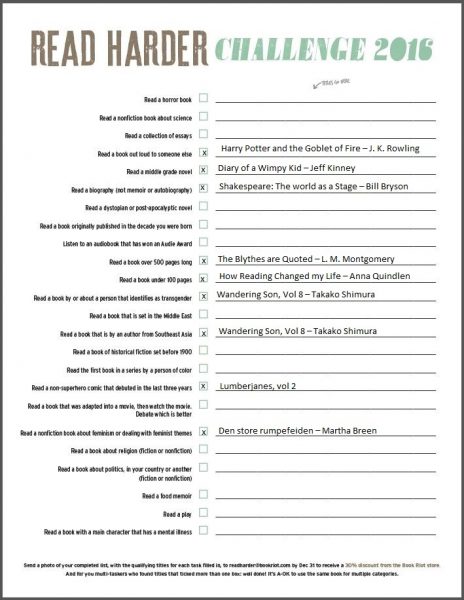 9 out of 24 tasks covered, without really paying attention. That’s not too bad. I need to actually focus my reading a bit more in the second half if I am to complete, though. The toughest task might be the audio book, actually. I should probably get a list of winners and check whether the local library happens to have any of them asap.
9 out of 24 tasks covered, without really paying attention. That’s not too bad. I need to actually focus my reading a bit more in the second half if I am to complete, though. The toughest task might be the audio book, actually. I should probably get a list of winners and check whether the local library happens to have any of them asap. I picked up Vol 1 of Wandering Son by
I picked up Vol 1 of Wandering Son by 
